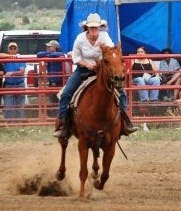Although I have not gotten much time in the saddle yet, I have spent a great deal of time this week working with the yearlings. I have never before worked with young horses and it is wonderful! There are 13 of them, all ranch bred, 9 of which are about one and the other 4 are two. The one year olds especially are very cute and very, very soft.
The first step to working with a yearling is actually catching it. This is much harder than it might seem since it is essentially feral and, though small, it is fast and hard-hoofed. We start by cutting a few out from the herd and herding them into a smaller pen. From there it is easier to separate one out and draft it into the round pen. Once in the round pen, the poor little guy usually panics and starts running around and around, scared to be alone and so close to a two legged carnivore who obviously intends to eat him. The first few times catching him is a battle, but it quickly gets easier once it has been handled a few times. They will often stop running, their eyes huge in their heads and their whole body shaking, as their brain battles their natural flight instincts. Once they face you, you can usually ease up to them and get a hand on them to get them caught.
The first moment of contact is transformative. Each time is like an epiphany in which the terrified creature suddenly realizes that they are NOT being devoured. After a few gentle strokes on the neck, they stop shaking, their breathing slows, and their eyes return to their sockets as they begin to relax. We rub them all over- on the face, neck, back, belly, and down the legs, until they stop flinching. We pull on their tails, fuss with their ears, and desensitize them to all manner of contact and stimuli. After a while they start to actually enjoy the experience. They will lean their heads into you searching for a scratch on the forehead, sniff at your hat, and sometimes their eyelids will flutter as they fight the urge to doze off. Once they understand what is being asked of them, they eventually allow you to lift their feet and to lead them around the arena.
This early process of desensitization is training not only for the horses but also for me and the other ringers. These young horses react to every movement you make. They are tuned into your energy and alert to your tone of voice. With older, well-trained horses, you can be fairly casual, even sloppy, but with these little guys you always have to be aware of yourself. Inevitably the horse you are working on will at some point bolt in surprise, so you have to be careful where you stand and how you hold them, both to be safe and to quickly regain control of the learning experience. If you are intimidated, you will teach your horse to be intimidated, but if you are too aggressive you will scare him. This activity forces you to be calm, assertive but gentle, and alert, all of which trains a good horseman as much as it does a good horse.
Subscribe to:
Post Comments (Atom)

No comments:
Post a Comment